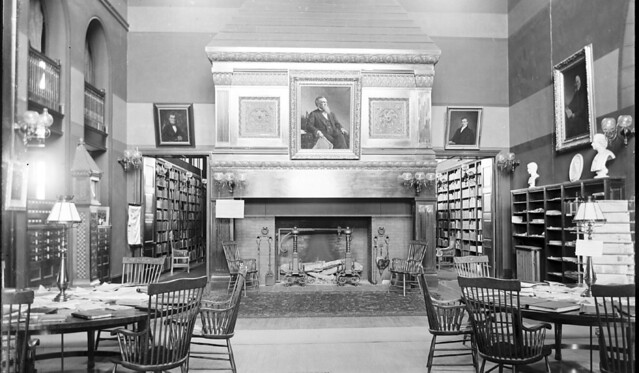Note: This post was inspired by archival material that we shared with UVM Continuing and Distance Education staff during a great tour of Special Collections earlier this summer.
In 1919, the UVM summer session, which ran from July 7 to August 15, was primarily a school for teachers. On July 25, the Burlington Free Press reported that 259 students were enrolled. Most of the students were from Vermont (221) and most were women (239). Just 27 were college graduates. The newspaper noted that 202 were teachers and 53 were Sisters of Mercy. The 1919 summer session catalogue and articles in local newspapers provide a good look at the academic programs and extracurricular activities that kept students and faculty busy.

UVM offered room and board at various locations. Summer students could eat at Commons Hall, located where the Fleming Museum stands now, for $6.00 per week.
Academics
Summer courses cost $10, and many were free for Vermont teachers and those preparing to teach in Vermont. Classes met five times per week, and one day each week was reserved for excursions and recreation. The busy daily schedules included time for a general assembly and for “Play and Games,” when all students and faculty were expected to spend a half hour in “wholesome, spontaneous and refreshing outdoor play” led by students in the physical training course.
The Education department offered ten classes, while departments such as Economics, Home Economics, English, French and Spanish offered two to four classes. There were opportunities to learn about teaching art and music, as well as fine art, piano and voice classes.
A number of classes were designed to help teachers address social and cultural problems. For the first time, Sara Holbrook, described as “not a mere theorist, but a woman who has been very successful in everyday work among the children in the public schools of Hartford, Connecticut,” offered a course on the education of “backward children,” to help teachers better understand their pupils and more intelligently work for their highest possible development. The Economics department offered “Reconstruction Problems,” dedicated to meeting needs related to the Great War, and “Rural Problems,” which explored ways teachers could help enrich rural life.

In the Billings Library, students could find 95,000 volumes on the shelves and “all the leading magazines published in this country and many of the best European periodicals” on the reading tables. Photo by William Sawyer, courtesy Vermont Historical Society
Extracurricular Activities: All Kinds of Good Times
The summer school catalogue promoted Burlington, on Lake Champlain between the Adirondacks and the Green Mountains, as a delightful place to spend the summer. One section described inexpensive excursions that could be taken in a day, such as trips to Ticonderoga and Ausable Chasm. Another section highlighted recreational opportunities accessible by trolley, including Burlington’s new 30-acre park off North Avenue, with “the best beach on the shore.” For exercise, students were directed to the UVM tennis courts and the Waubanakee Golf Club, which opened its “beautiful golf links” to students at a moderate price.
During the session, public lectures, entertainments and concerts and recitals by pupils in the music department were attended by students and the general public. The Burlington Free Press announced and reviewed these events throughout the weeks of the summer session. For the first public entertainment, Theron S. Dean gave an illustrated lecture on “The Green Mountains and the Long Trail,” scheduled for the late hour of 8:30 pm so that Mr. Dean’s glass slides would be more visible. The entertainments culminated with an ambitious musical and dramatic program at the Howard Relief Hall on Pearl Street.
Personal Improvement
The summer school bulletin included advice about the importance of personal growth from J. Franklin Messenger, director and professor of education. Messenger cautioned summer school students, “Do not carry too many courses. You will improve more from a few courses thoroughly mastered and well assimilated than from a large number attended.” He suggested, “Take at least one course for personal improvement. A teacher who can go to her work with more intellectual resources and a broader outlook on the world, with a richer experience to share in part with her pupils, will be able to stimulate those pupils and give an atmosphere to the school which is worth more than many a class exercise.”
Prudence Doherty, Public Services Librarian



